In business, overextension is a term used when financial commitments extend beyond capacity to meet the agreed-upon terms. When you are unable to pay your debts, vendors and service charges, your business health is at risk.

Overextending describes a situation that is not sustainable and easily spirals out of control as you take on more debt and lack the funds to reinvest in your business.
We live in a frenetic world, and it is hard to keep up, leading people to become overextended on many levels. There are competing priorities and incessant demands that may cause you to feel stretched beyond your capacity to meet personal or financial obligations. If not addressed, this perpetual loop can take its toll on physical and emotional health.
What are some of the problems that come from overextension in business?
A business struggling to meet its obligations is an overarching problem with consequences that include:
- Incapacity to make timely debt payments, leading to late fees.
- Downward rating in creditworthiness, inhibiting the ability to secure credit except with prohibitive loan interest rates.
- Being ill-prepared for unexpected expenditures, such as a structural repair to the property.
- Inability to build working capital to procure materials and supplies.
- Lack of capacity to reinvest in your business.
- Lost opportunities if surges in demand require expeditious restocking.
- Loss of credibility in business, which has manifold repercussions.
During the vicious cycle of overextension, you may see an overlap where your personal and professional life intersect. When a business is in a downturn, the strain has a deleterious impact on relationships.
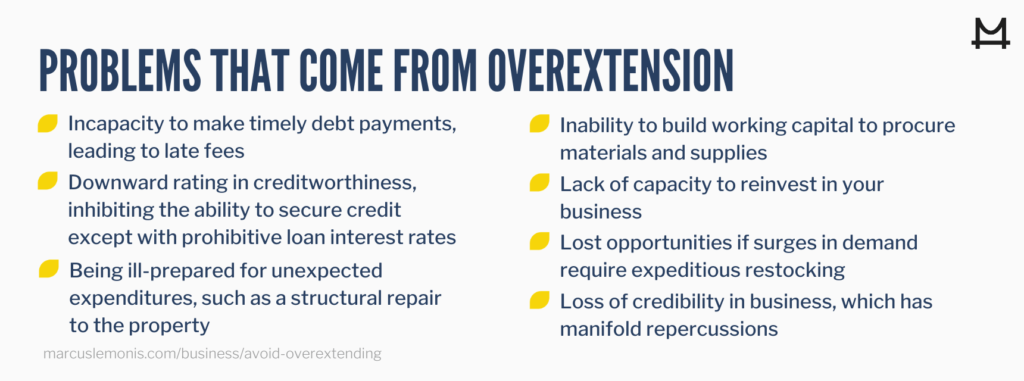
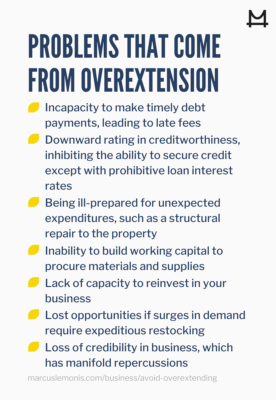
Business overextension
A prime example of problems that come from overextension in business is the story of a unique bakery that creates made-to-order cupcakes. Marcus provided consultation to the bakery in 2015 when he visited the business in Inwood, New York City. What was most glaring to Marcus when he walked into the shop was that it was in dire need of renovation.

Secondly, when the owner served Marcus a sample of the bakery’s creation, Marcus asked how much it cost to produce the cupcake, and the owner’s response was nebulous. At best, it was a guesstimate. This was a red flag. As Marcus has said, “If you don’t know your numbers, you don’t know your business.”
To get down to the numbers, Marcus sat with the owner and his wife along with his sister in her role as store manager. A review of the company’s profit and loss statement left his wife thunderstruck. It came to light that the debt exceeded $100,000, and his wife’s investment of $250,000 was gone. He was unable to meet his loan payment obligations, renovate the shop and pay his sister fair wages.
Until that moment, his wife was not aware of money lent to underprop the business other than her own investment. Even before this crystalline moment, she had said the problems with the business were putting stress on their marriage.
Another business experiencing financial commitments that could not be met was a NYC cookie business. In 2019, Marcus provided consultation to Rachel, the business owner. At the time, Rachel was carrying outstanding loans with interest rates ranging from 12% to 36%.

These are examples of overextension consequences that result in a struggling business, personal stress and crumbling relationships.
Having a high debt-to-income ratio is not limited to individuals or small enterprises. PG&E (Pacific Gas & Energy), an American-owned utility company based in San Francisco, California, ranked 189 on the 2020 Fortune 500 list. In 2019, the California energy supplier filed for Chapter 11 bankruptcy, following the devastating wildfires in 2017 and 2018. As reported in 2019, PG&E’s long-term debt was $18.6 billion with an annual revenue of $16.8 billion.
FirstEnergy Corp., based out of Akron, Ohio, is another utility company on the Fortune 500 list with a ranking of 294. Reportedly, they have a long-term debt of $17.8 billion with an annual revenue of $11.3 billion.
Common mistakes that lead to a business being overextended
Mistake # 1: Not fully understanding your company's financials
One crucial mistake is avoiding the numbers. Before making business decisions, get your arms around such critical metrics as production cost, overhead, labor cost and anticipated repairs. Using the bakery as an example again, the owner had already signed a lease for a new bakery location before calculating projected profit. After consulting with Marcus, it became evident that anticipated sales less labor and rent translated to a loss. Marcus explained to the owner, “We have to prove that we can make money without adding locations, and we have to find ways to actually put cash in the bank. Until that happens, we shouldn’t be doing anything else.” The owner pushed back at first, but as Marcus says, “At the end of the day, the numbers don’t lie.”

Mistake # 2: Cutting off communication
No one is an island. If people you trust with a vested interest in the company present ideas that may mitigate overextension, hear them out. Even if you disagree, what they have to say may inspire creative solutions. Resistance to change and trust issues thwart this process. In the case of the bakery, one of the hurdles was the owner’s tendency to tune out when people tried to advise him. This behavior runs counter to Marcus’ thinking that, “You don’t have to be a genius to run a successful small business, but you better be smart enough to be willing to learn.”
Mistake # 3: Letting passion override self-care
Passion about your business is essential, and you certainly don’t want to lose that. The same is true about emotional bonds with family and friends. As Marcus says, “If you don’t love what you do, then you shouldn’t do it.” But sometimes you may find yourself doing too much. If you don’t take care of yourself, you will not be in any condition to take care of your business or the people in your life.
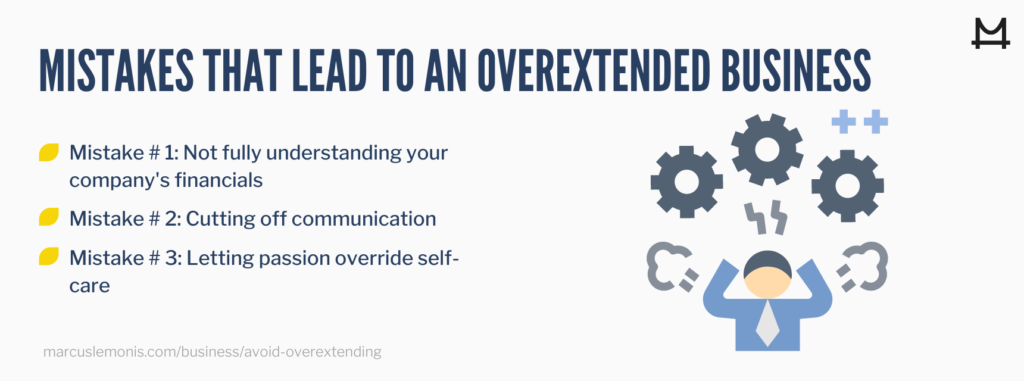
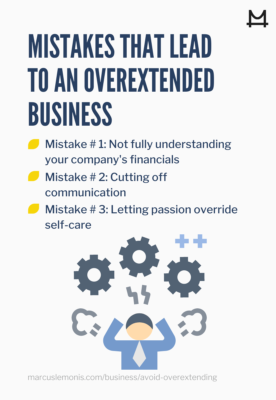
Tips to avoid overextending you and your business
Tip # 1: Know your numbers
Always keep an eye on your numbers, including inventory, production cost, human resources, vendor contracts and margin. Be methodical. Marcus always says, “We have to know how much money we have, what we’re spending it on, and keep track of our expenses at all times.”
Tip # 2: Pay attention
Surround yourself with people you trust, and heed their admonishment if your numbers are in jeopardy or if you need to wind down personally. Common yet worthwhile advice is to avoid living beyond your means. That applies professionally and personally. If you need help, bring in a professional advisor. Sometimes we are too close to the situation to be objective, and we need a third party to be the voice of reason.
Tip # 3: Learn to say no
Sometimes, we simply have to say no. Whether it is giving away your free time or undervaluing your product, you are not helping anyone by always being agreeable. Hesitate before you say yes.
Take the time you need to think about it. What may appear as an opportunity too good to pass up in the moment may appear after contemplation as a ghostly apparition in disguise.
VTS (View The Space), a leasing and asset management platform, was included in the 2016 list of best medium workplaces in the United States.
Thrive Global published an interview with Michelle McComb, VTS Chief Financial Officer, in 2019. One of the leadership lessons the CFO shared is to not overextend or under-deliver. She explained that she had welcomed challenges earlier in her career that were not her bailiwick. Since then, she learned to say no. “You want to deliver quality work, and in order to do that, your wheelhouse needs to be in order.”
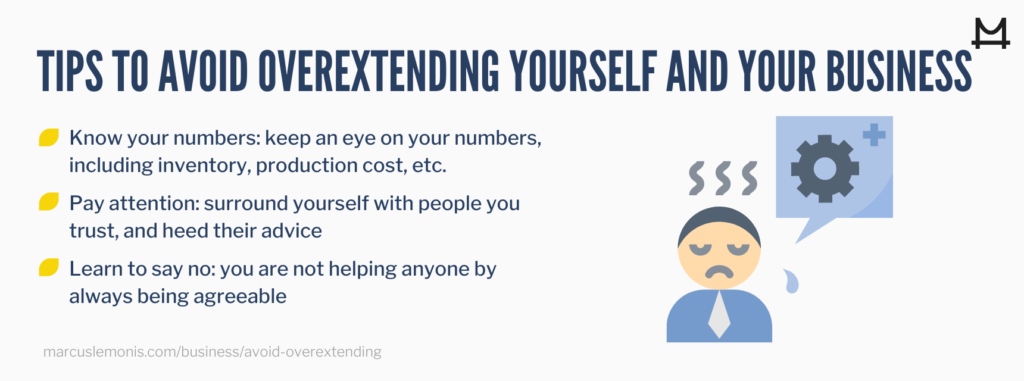
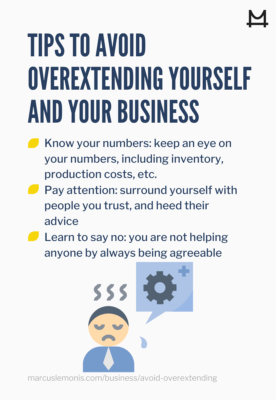
Marcus shared this insight: “I respect money, and I think that a lot of people don’t.” As an entrepreneur, analyze your balance sheet assiduously. Recognize the value of your product or service and the costs to bring that product or service to market. Ensure the business is thriving before expanding into new territory. That applies to physical locations and product lines. Don’t feel you have to do this alone. Communicate with people you trust to be sure your judgment is not clouded by your spirit of adventure.
On a personal level, look out for the telltale signs that you need to take a break, reprioritize or shift your focus. Be resolute in monitoring personal finances by keeping a record of your monthly expenditures and income. Avoid spending more than you have to ensure you are always prepared for emergencies. After all, change is a certainty.
- Do you think your business is currently over extended?
- What tips listed above can you use to avoid overextension in your business?
Comen, E (2019, June 28). Companies with the Biggest Corporate Debt.
Retrieved from https://247wallst.com/special-report/2019/06/28/companies-with-the-biggest-corporate-debt/2/Fisher, A (2019, May 9) “Don’t overextend yourself and then under deliver” With Michelle McComb, Chief Financial Officer at VTS.
Retrieved from https://thriveglobal.com/stories/dont-overextend-yourself-and-then-under-deliver-with-michelle-mccomb-chief-financial-officer-at-vts/Fortune (2020, May 18). Fortune 500.
Retrieved from https://fortune.com/company/pge-corp/fortune500/VTS (2016, October, 12). VTS Named One of the Country’s Best Medium Workplaces by Fortune Magazine.
Retrieved from https://www.vts.com/news/vts-named-one-of-the-countrys-best-medium-workplaces-by-fortune-magazine





